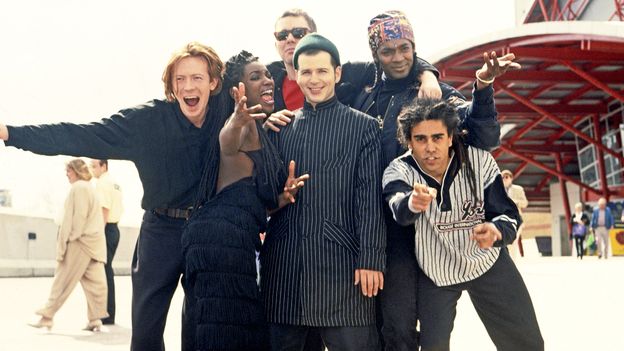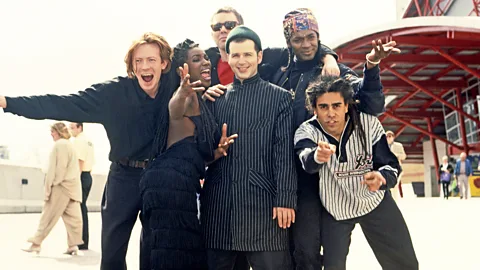 Alamy
AlamyIn 1997, a feelgood house track soundtracked Tony Blair’s election campaign. Now 27 years on, it’s back in the headlines. With D:Ream set to play Glastonbury 2024, the band discuss its impact.
Even Rishi Sunak’s most loyal supporters would agree that 22 May 2024 wasn’t his best day. Standing outside his official London residence, 10 Downing Street, the British prime minister announced that he was calling a general election, so voters would have to choose between his Conservative Party (also called the Tory Party) and the opposing Labour Party. Unfortunately, Sunak made this announcement while being drenched by the bucketing rain, so he wasn’t looking too confident. To dampen his spirits further, the speech was accompanied by D:Ream’s Things Can Only Get Better, a song that had been used by the Labour party when they swept to victory in the 1997 General Election under their charismatic leader, Tony Blair.
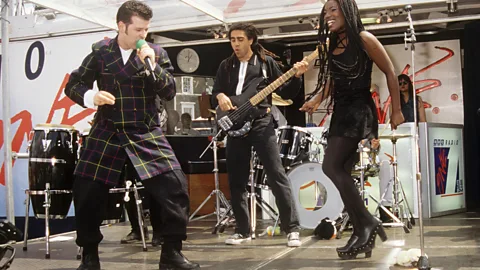 Alamy
AlamySunak wouldn’t have wanted voters to remember that result. And, in fact, on this occasion Labour had nothing to do with the song being played, nor did it signify that the party was sure to triumph. But an anti-Tory activist, Steve Bray, was standing at the end of Downing Street, blasting out Things Can Only Get Better on a portable PA system. “I heard the rumour on the day that he was going to call an election,” Bray tells the BBC with some relish, “and I thought, what could be the most appropriate tune to troll him? I wasn’t actually endorsing Labour, I was telling the Tories that their time was up – and things can only get better. What I liked about it was, with all those microphone feeds, it went all over the world.”
Thanks to this expertly timed piece of mischief, Things Can Only Get Better has become a memorable part of not one but two British general elections now – just in time for D:Ream to play it at the Glastonbury Festival tomorrow. But its astonishing 30-year history features plenty of other claims to fame. D:Ream’s keyboard player at their early shows was Brian Cox, a physics professor who presents science programmes on British television and radio, so the makers of A Shaun the Sheep Movie: Farmageddon (2019) had an animated Sir Brian playing the song at the end of the film. Even more bizarrely, The Crown had a dream sequence in which Tony Blair is crowned king, and the “new national anthem” is sung by a cathedral choir. “It just gets weirder and weirder,” Peter Cunnah, D:Ream’s singer, tells the BBC. “When I heard it [during the election announcement], I put my head in my hands and said, ‘Oh my God, not again…'”
The origins of that famous phrase
The song was conceived back in 1990. Cunnah had moved from Northern Ireland to London as the guitarist of an indie band, Tie The Boy, and when they broke up he began making dance music while holding down a “really boring office job”. One of his colleagues was Ragna Gift, the sister of the Fine Young Cannibals’ singer, Roland Gift. “One day there was a bit of office argy-bargy going on,” says Cunnah. “I was crestfallen, and Ragna said, ‘Never mind, Pete, things can only get better’. As a writer, your radar’s always going, and the melody came straight into my head. I went into the toilet with my Sony Walkman and recorded it.”
Stream Glastonbury 2024
For the first time, the BBC is livestreaming Glastonbury performances to a global audience, with Dua Lip and Coldplay’s 2024 Pyramid Stage sets available to view on bbc.com, offering fans around the world a front-row seat to headline acts like never before.
Like so many of the song fragments that Cunnah put on tape around that time, this one gathered dust until he started collaborating with D:Ream’s other key member, Al Mackenzie. Late in 1991, they needed a chorus for a house track, and Cunnah belted out the phrase that would change his life – much to his partner’s amazement. “I thought he’d just come up with it, so I was very impressed,” says Mackenzie. That night, he played the track in a club in London’s Leicester Square where he was DJing. “The place just exploded,” says Cunnah. “The reaction was instant.”
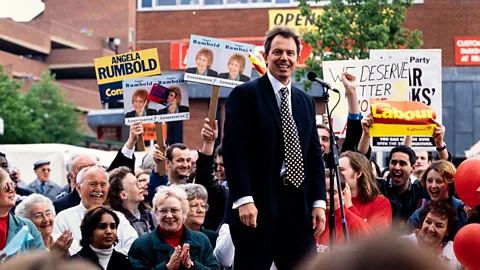 Alamy
AlamyThe song’s breakthrough to the mainstream wasn’t quite so immediate. Having built it into an irresistible gospel-disco anthem with an explosive choral refrain, D:Ream released Things Can Only Get Better as a single in January 1993, but it stalled at 23 in the UK charts. Later that year, though, the group toured as the opening act for Take That, Britain’s biggest boy band, and attracted “an audience of young girls who started sending teddy bears to our office”, says Cunnah. When the song was reissued, it topped the British singles chart for four weeks in 1994.
After years of success on the club scene, D:Ream were household names at last, the irony being that Mackenzie had already left the group over musical differences, and Cunnah was beginning to feel that, as he was reaching his late twenties, he was getting too old to be a pop star. Little did he know that Tony Blair was in the process of rebranding the Labour Party as the shiny and inclusive New Labour. Part of the process was cutting back on the use of a traditional socialist dirge, The Red Flag, at party conferences. But what could replace it?
When politics harnesses pop
“Bill Clinton had used Fleetwood Mac’s Don’t Stop at rallies in 1992 and 1993, so New Labour might have stolen the idea [of using a pop song] from him,” says Dr Stuart McAnulla, an associate professor in Politics at Leeds University. “What happens in American politics often comes over to the UK in some form.” The choice of Things Can Only Get Better was a shrewd one, he says. “It’s upbeat, it’s catchy, it got to number one for a few weeks, but not for so long that people were sick of it. And in itself, it’s not a political song. It had the sense of the possibility of renewal, but there was nothing in it that the Tories could latch onto and say, ‘Look, they’re going to put your taxes up!'”
Nowadays, pop songs are heard regularly at political events. Theresa May, then the Tory prime minister, took the stage to Abba’s Dancing Queen at a Conservative Party conference in 2018, which some read as a self-deprecating reference to the stiff dance moves she showed African children on a trade mission two months earlier. But back in the mid-1990s, Cunnah was wary of being linked to Labour. His new manager, Jazz Summers, “was a very persuasive man”, he says, and soon he agreed to perform the song at the party’s meetings and rallies. “It was the weirdest thing for me. We came from the house music scene, and there I was, almost retired, jumping around on stage again, doing one song instead of a whole set, in front of people who were clapping out of time, because they had no sense of rhythm. I’ve often thought that if you want to elect a government, you should make them have a dance-off.”
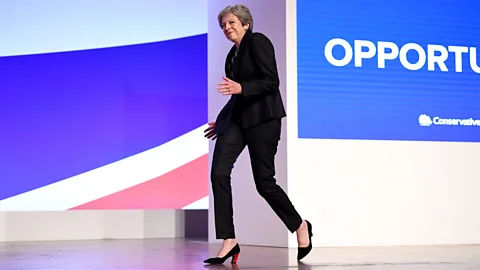 Getty Images
Getty ImagesD:Ream’s uplifting, quasi-religious hit proved to be a perfect match for the optimism of Labour’s supporters as the election approached. “The Conservatives had been in power for 18 years,” says McAnulla, “and after they won in 1992, people thought the Labour Party was finished. It was only in the lead-up to the 1997 election that they thought that maybe it could be different – and the song spoke to that mood.”
The exultant chorus felt even more appropriate after Labour secured its landslide victory. When John O’Farrell, an author and scriptwriter, wrote a comic memoir about campaigning for the party while it was in opposition for 18 years, it was clear what the title should be.
“I toyed with all sorts of working titles such as Hard Labour or Labour of Love,” says O’Farrell. “But Things Can Only Get Better became the obvious choice, not just because of the association with the Labour landslide at the end of my story, but also because it felt like a funny comment on being a Labour activist during the dark days of [Conservative prime ministers] Thatcher and Major.” The memoir was a number-one bestseller in 1998. “But it did mean that every bloody book event I did afterwards started with someone in the front row asking, ‘So, did things get better?'” The answer to that question is debatable. When O’Farrell wrote a sequel, he called it Things Can Only Get Worse?.
The song’s afterlife
Cunnah’s euphoria wore off, too. The band split up shortly after the 1997 election, while the Labour government’s popularity inevitably waned, and after the UK invaded Iraq along with the US, he found himself being accused of having “blood on [his] hands”; the band. However, according to McAnulla, Labour’s use of the song “invested it with a greater status and a wider meaning than it would have otherwise had”. Cunnah and Mackenzie reformed the group in 2008 and over the years, the public started to see it less as a party-political rallying cry and more as an all-purpose declaration of hope and defiance. It was adopted as a football chant by fans of the resurgent Sunderland AFC in 2013; and in 2021 it was sung by Sea of Change, an Irish women’s choir of cancer survivors and supporters. “People have found so many ironic uses for it,” admits Cunnah, “but there have been so many unironic uses as well. I’ve had friends who were going through chemo and stuff and told me that they found solace in the song.”
That being the case, you can understand Cunnah’s dismay when Bray chose it for his Downing Street prank in May, thereby turning it into a political slogan once again. “We’re on our fifth studio album. We’re trying to get out of the quagmire [of politics], but just when we think we’re getting to escape velocity, this keeps dragging us back in.” Still, there are no hard feelings – or not many hard feelings, anyway. Bray’s stunt propelled the song to number two on the UK’s iTunes chart, and when he mentioned on social media that the rain had damaged his amplifier, D:Ream sent him £250 towards the cost of a replacement.
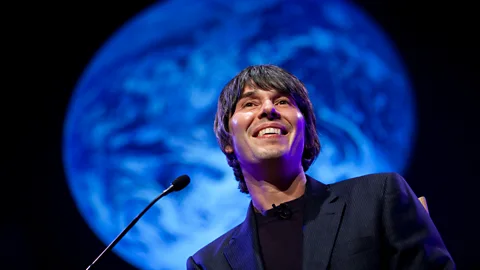 Getty Images
Getty ImagesAs for Cunnah and Mackenzie, they have played Things Can Only Get Better in concert ever since they reformed the group in 2008. At this year’s Glastonbury they will be performing it “on steroids”, says Mackenzie, with a brass section and special guests.
Cunnah confesses that he is only just coming to terms with the way the song has been “hijacked”, and that he wouldn’t approve of Labour’s using it today – not that they’ve asked. Mackenzie is more philosophical. “We just try and keep away from all that stuff,” he says, “but if people want to use it as an anthem, that’s up to them. I’m happy for them to interpret it and use it in any way they want. I’d just like people to have a dance to it.”
The Glastonbury Festival runs until Sunday 30 June. The BBC is livestreaming Glastonbury Dua Lip and Coldplay’s 2024 Pyramid Stage sets to a global audience – they will be available to view on bbc.com.

